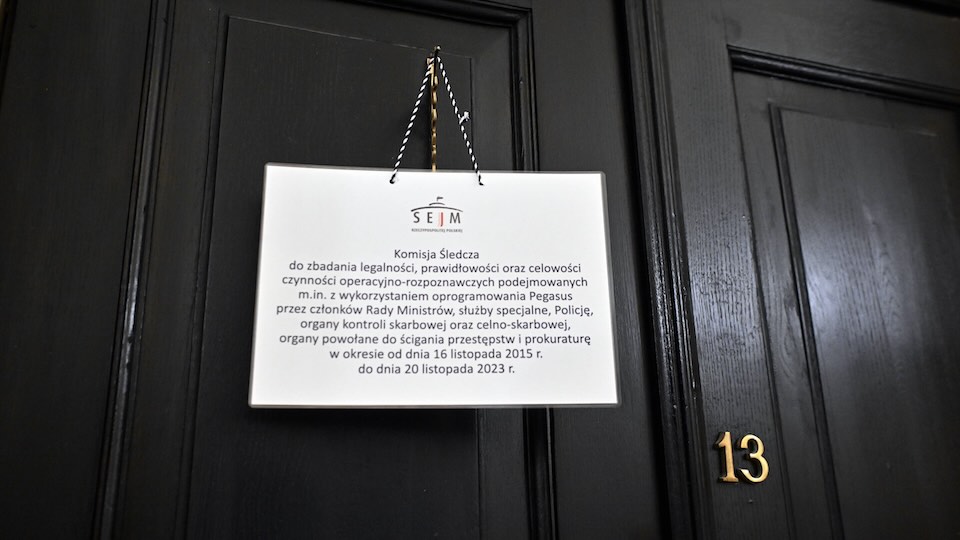Poland: Former intelligence chief compelled to appear before Pegasus committee

The former head of Poland’s Internal Security Agency (ABW), the country’s domestic intelligence service, was arrested on Monday and brought before the Pegasus committee in parliament. The committee is investigating allegations that the former government led by the Law and Justice party (PiS) spied on political opponents. The PiS government was voted out of power in fall 2023.
Piotr Pogonowski led the intelligence agency from 2016 to 2020 under the PiS government. According to media reports, he had ignored three summons to appear before the investigative committee. His testimony on Monday came after a court ordered the police to compel him to appear.
The Polish news site Onet reported that this was the first time in the history of the Sejm, the lower house of Poland’s parliament, that a witness has been compelled to appear before an investigative committee in this manner.
No concrete answers
Pogonowski, who currently sits on the board of the central bank, claimed when questioned by the committee that he first heard about Pegasus from the media. He later clarified however that he was referring to the name “Pegasus” – not to the actual surveillance software.
According to media reports, during his testimony before the committee Pogonowski repeatedly noted that by law he was prohibited from discussing certain aspects of his work at the intelligence agency. He refused to give concrete answers to many questions – though he did state in general terms that Polish security services made use of modern technology. After a recess, the committee continued its questioning of Pogonowski behind closed doors.
Magdalena Sroka, head of the Pegasus committee, said that Pogonowski was an important witness because he led the ABW during the period of time when the Polish government is believed to have purchased Pegasus. The agency is also believed to have used the spyware.
Poland’s Supreme Audit Office declared in 2022 that it had found an invoice showing that Polish authorities had bought Pegasus. PiS ultimately admitted to the purchase – but denies having used the spyware to spy on opposition leaders.
Opposition leaders surveilled
Pegasus is a form of spyware developed by NSO Group, an Israeli company. It can take complete control of an infiltrated device – without the target of the attack ever having to click on a link or perform any other unwitting action to grant the attackers entry. Attackers gain access to all the data saved on the device. They can track the device’s location and turn on the microphone and camera without the device owner’s knowledge. The surveillance software has been linked to human rights abuses and has come under criticism for years.
In Poland, the former PiS-led government is alleged to have used Pegasus to spy on political opponents. Security experts from the University of Toronto’s Citizen Lab were able to prove for example that in the lead-up to elections in 2019, the smartphone belonging to Krzysztof Brejza was infiltrated by Pegasus. At the time, Brejza was leading the opposing coalition’s campaign.
Citizen Lab’s experts were able to find additional evidence that lawyer Roman Giertych was also spied on in 2019. One of his clients at the time was Donald Tusk, then head of the Civic Coalition, an alliance of opposition parties. Since December 2023 Tusk has been Poland’s prime minister.
The new Polish government >launched the investigative committee in January of this year.
Last fall, Poland’s Senate came to the conclusion that the purchase of surveillance software was illegal. The Senate also concluded that because Pegasus was used to spy on opposition leaders, the 2019 elections were not conducted fairly.
According to a preliminary report put out by the Justice Ministry earlier this year, the former PiS-led government used Pegasus to surveil nearly 600 people. Among other matters, the Pegasus committee is tasked with investigating whether these surveillance measures were legal. Current Justice Minister Adam Bodnar stated in April that the authorities evidently obtained court authorizations before engaging in surveillance. Still, in Bodnar’s judgement, the courts were not fully informed about the use of Pegasus.
In September the Prosecutor General’s office brought charges against former Deputy Minister of Justice Michał Woś. He is alleged to have approved the illegal transfer of funds from a Justice Ministry fund to pay for the purchase of Pegasus spyware. Woś disputes the charges.
More PiS politicians have been called on to testify before the investigative committee – including former Justice Minister Zbigniew Ziobro. Current Justice Minister Bodnar has requested that his predecessor be compelled to appear. Last month Bodnar submitted a motion to parliament requesting the body’s consent for this measure – a necessary step, given Ziobro’s legal immunity.
Ziobro has cited health reasons for not appearing before the committee before now. Like former intelligence agency head Pogonowski, however, he also points to a September decision by the Constitutional Tribunal (TK) which stated that the Pegasus commission was unconstitutional. The new ruling coalition for its part does not acknowledge the legitimacy of this court – arguing that the PiS government unlawfully packed the tribunal with political allies. In September Poland’s parliament passed a law aimed at reforming the constitutional court. (js)